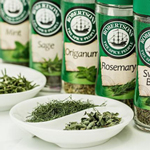More Herbs, Less Salt Day Date in the current year: August 29, 2026
 More Herbs, Less Salt Day is observed annually on August 29. It was created to encourage people to eat a healthier diet by showing them that healthy food doesn’t have to be bland.
More Herbs, Less Salt Day is observed annually on August 29. It was created to encourage people to eat a healthier diet by showing them that healthy food doesn’t have to be bland.Salt is an important cooking ingredient not just because it makes food taste better; salt is the principal source of sodium that is necessary for heart activity and metabolism. However, too much sodium is bad for your health. Excessive consumption of salt can lead to high blood pressure, cardiovascular disease, stroke, fluid retention, kidney disease, and other health problems.
Since salt is present in most processed foods, the best way to decrease your salt intake is to avoid processed foods and reduce the amount of salt in cooking by adding other flavor enhancers such as herbs and spices.
The main difference between herbs and spices is that spices are derived from seeds, roots, bark, or fruit of various plants, whereas the term “herbs” refers to the leaves, stems, or flowers of plants. There are plants that are used as both herbs and spices, for example, dill, celery, and coriander (in American English, coriander is sometimes referred as cilantro when used as a herb).
Popular culinary herbs include basil, bay leaf, celery, chervil, chives, coriander, dill, garlic chives, kaffir lime, lavender, lemon balm, marjoram, mint, oregano, parsley, rosemary, rue, sage, tarragon, thyme, and others. Most of them have been used to add flavor to dishes for centuries and even millennia.
Most herbs can be used both fresh and dried. Some people think that fresh herbs are better than dried herbs, but the choice depends on the recipe, situation, and flavor you want to get. Fresh herbs are more often used in uncooked dishes, dressings and sauces, and as a garnish. Dry herbs are better for foods like stews, soups, and other cooked dishes.
In some recipes, it is possible to substitute dry herbs for fresh herbs. If you want to use dry herbs instead of fresh herbs, you should keep in mind that dry herbs have a more concentrated flavor, so you’ll need to use less of them. The general rule of thumb is to use a third of the amount that the recipe calls for.
Fresh herbs contain more vitamins, minerals, antioxidants, and other essential nutrients than dry herbs; on the other hand, dry herbs have a longer shelf life. So really, you don’t have to choose one or the other. Herbs are a great addition to almost any dish regardless of their type and form.
More Herbs, Less Salt Day was created by Ruth and Tom Roy of wellcat.com, who have come up with more than 80 holidays and observances. This observance encourages people to reassess their sodium intake and cut down on salt by using more herbs and spices. A similar food holiday, National Herbs and Spices Day, is celebrated on June 10.
You can celebrate More Herbs, Less Salt Day by giving a new life to your favorite recipes, creating your own salt-free seasoning blend, or thinking about growing fresh herbs in your garden or on your windowsill. And don’t forget to spread the word on social media with the hashtag #MoreHerbsLessSaltDay.
- Category
- Unofficial Holidays
- Country
- USA
- Tags
- More Herbs Less Salt Day, unofficial holidays, food days, culinary holidays, observances in the US, culinary herbs